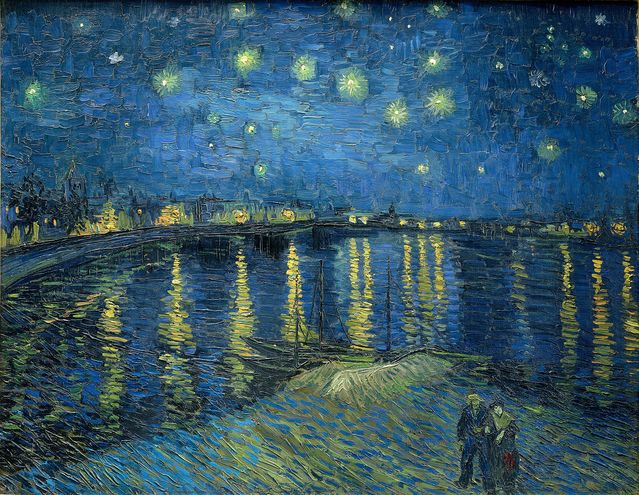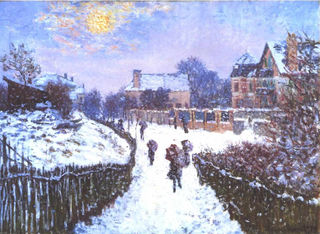Adolescence
Why Popular Culture Psychology? The Power of Story
Van Gogh, Monet, Jesus, and Aesop shared deep truths through images and tales.
Posted March 10, 2018

At a teaching conference this week, I gave a presentation, "Harnessing the Power of Story," describing how I got into the popular culture psychology business. For a fan of a character or even some with passing curiosity, psychological analysis of that character can be fun and interesting, but there's much more to it than that. People teach through examples. Stories are powerful communication tools. They can bypass existing biases and expectations to get people to look at real human issues with fresh perspective. Ancient myths addressed things people were curious about. Jesus is known for (among other things) teaching through parables. Aesop had his fables. In the 1960s, Star Trek explored social issues no other fiction on TV touch, and they could do it by taking one step away from "reality" to apply that filter of fiction.
I asked people online for their thoughts on why popular culture psychology works - after letting them all know they might get quoted here, of course.
What's the point in analyzing popular culture psychologically?
Why bother looking "inside the heads" of made-up characters?
Shouldn't we be studying real heroes instead of fictional ones?
Previously, I shared some of the answers here but left out these responses that people gave on Facebook, mainly due to length.
- J.B.: I figured that I'd give it a shot. I hope this helps. :)
- Popular culture gives a "snapshot" of the collective values and interests of a society. By analyzing what makes up popular culture, we learn more about ourselves and others.
- Made up characters, especially ones grounded in some form of reality, offer a unique perspective on the human condition. Unlike most people, with fictional characters we have a sort of omnipotence about what the most important moments and character interactions are and can often examine both their unfiltered thought process and their outward actions in relation to the world around them.
- The Greeks and many other cultures used fictional characters in parables to teach moral lessons and praise the best traits of humanity. Such stories were useful because the lessons were both enjoyable and memorable for the audience.
- S.H.: I think that the popular culture that appeals to us says something about our own psychological makeup. It's more of a mirror of society than a window into their heads. Why bother looking "inside the heads" of made-up characters? Again, it holds a mirror to society. Understanding made up characters helps us understand ourselves.We absolutely should [study real heroes]. But fictional heroes are a bit more extreme in their characters. They give us examples of psychology under the most stringent conditions. When we analyze them, we can understand real life heroes that much more. Just a lay person's pov.
- M.C.: I figure it's similar to why we like pondering fictional dilemmas on shows like Star Trek...it's exploring something we'll never encounter in the real world...mostly an interesting mind exercise...
- M.C.S.L.: We should examine everything when we have the opportunity, for the sake of examination itself. Examination is how we learn, and everything we do is based on the product we've trained our minds to provide us. Satisfaction and fulfillment are also important in life, and our brains are the least expensive, most portable entertainment and gaming single-player console in existence. The more software we're able to feed them, the better our time with them is. As for reality, the psychological issues of fictional characters are real issues depicted in via fiction. By studying them, we are studying real people by studying very real issues shared by many -- and sometimes all -- people.
"Why bother looking "inside the heads" of made-up characters?"
I know people who play video games far beyond the linear storyline, obtaining the "100%" trophies. They do it because sometimes they learn new things about the game, or because they want to get everything out of the game possible. Whether it's literary analysis applied to a book or psychological analysis applied to a work of pop culture, sometimes people want to experience something thoroughly. In addition, what we examine is what we learn. What we learn is what we can use. What we can use makes a difference in what we can do. -
 Monet's Boulvard Saint Denis, Argenteuil in Winter.Source: Wikimedia
Monet's Boulvard Saint Denis, Argenteuil in Winter.Source: WikimediaJ.B.M.: I think standout pop culture characters and the way they interact with others are often manifestations and amplifications of the author's observations and experiences of art and life, presenting a unique view into the human psyche that can be examined publicly in an ethical and greatly entertaining way. In a sense, it's almost an impressionistic view into life, as if looking through the lens of Van Gogh or Monet. The lessons, moods, and humanity are all there to see in vibrant color.
- E.B.: The analysis of popular culture is the analysis of the zeitgeist of our age. It reveals the values and interests that are both specific to our time and universal to our race. Studying the heroes and villains of our imaginations reveals the way we perceive good and evil and the relative shades of gray in between through stories and characters that move us emotionally and intellectually. Understanding what makes us laugh or cry collectively is an important revelation of how we see the world and each other. Every age is defined by its popular stories. From the ancient Akkadian Gilgamesh to this week’s release of the Black Panther, these heroes and villains fascinate and instruct us in our own heroic journey through life.
- C.D.: Wow! Where to start? I use characters in counseling: First it is a great way to establish the most important part in counseling, the therapeutic alliance. Fans will instantly start talking. Second, even my teen boys love coloring and the heroes or villains are great and safe ways for us to explore serious issues and experiences. Third, I can learn more about my client by their favorites ( good and bad .) There are so many more, but we actually talked about this yesterday. Fourthly, we discussed several characters from Naruto who had experienced great loss, hardships and pain. Some characters became bitter and evil and used their experiences to justify further evilness. Some started evil and found redemption and new ways to live ( my favorite, great into for narrative journaling ) and some characters remained determined and hopeful no matter what...”believe that!” My two cents.
- C.M.: ‘Real vs fictional’ Goes by the wayside with Wonder Woman. She became ‘real’ when she started to have a real impact on real people’s lives. That started in 1941, and continues to this day. Meanwhile, living heroes are only human, so they will always fade away with time, unfortunately.



